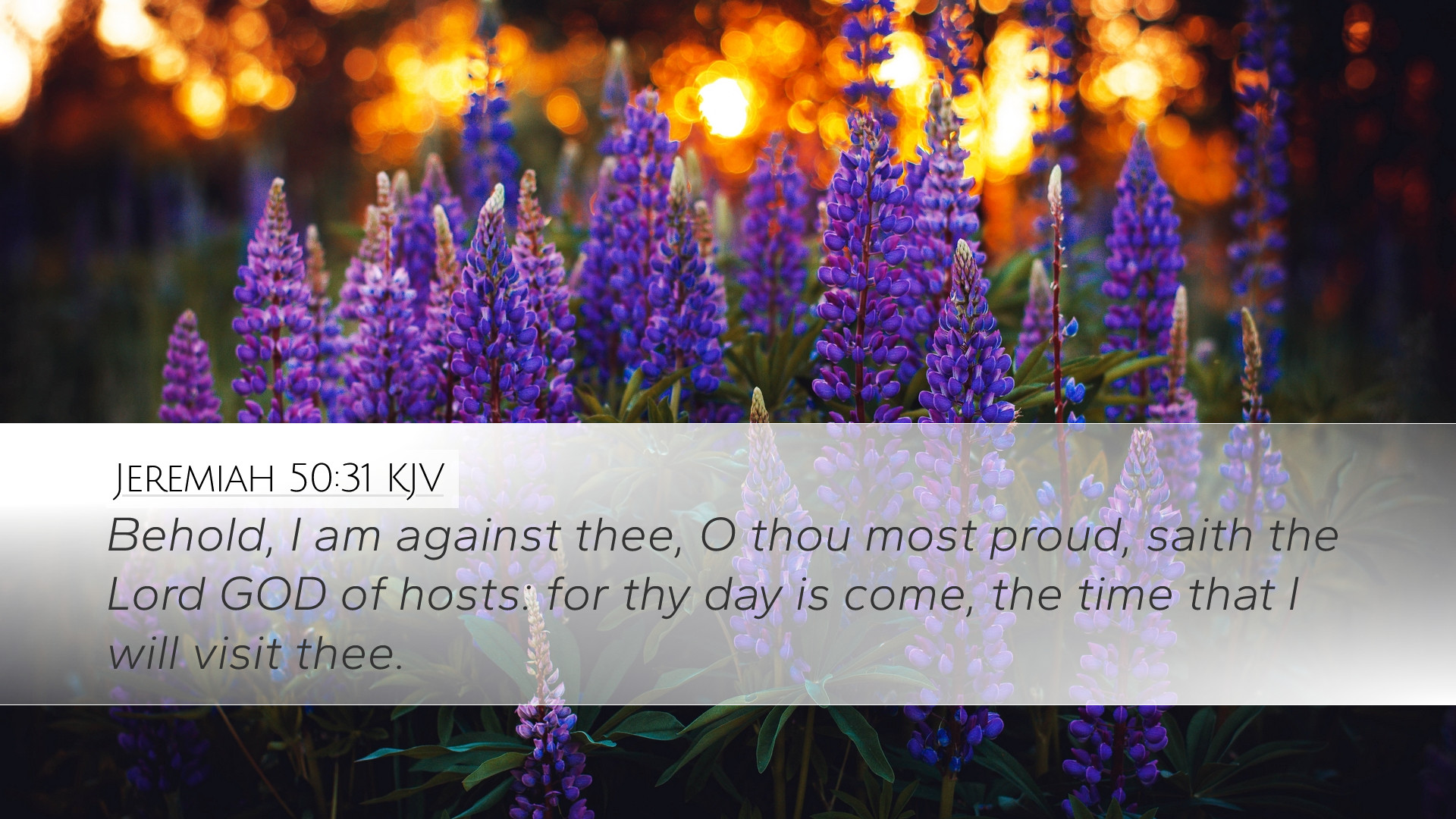Commentary on Jeremiah 50:31
Jeremiah 50:31 reads: "Behold, I am against thee, O thou most proud, saith the Lord God of hosts: for thy day is come, the time that I will visit thee." This verse serves as a divine proclamation regarding the impending judgment upon Babylon, a theme central to the prophecies of Jeremiah. In examining this verse through the lens of revered public domain commentaries, we delve into its theological implications, historical context, and its relevance for contemporary readers.
Understanding the Context
To fully grasp the significance of Jeremiah 50:31, one must consider the historical context surrounding Babylon during Jeremiah's prophetic ministry. Babylon was at the height of its glory, marked by power and pride. The chapter serves as a part of a larger oracle against Babylon, illustrating God's judgment against nations that elevate themselves above His authority. Matthew Henry highlights that the proud nature of Babylon was not merely a political stance but a spiritual rebellion against God (Henry).
Pride Defined
Pride is often viewed as the root of many sins. Albert Barnes emphasizes that the pride of Babylon made it a target for God's judgment. This pride is characterized by an attitude of defiance against God and His people. The term "most proud" indicates an extreme pride that leads to destruction, echoing the biblical principle that pride goes before a fall (Proverbs 16:18).
The Divine Declaration
The phrase "I am against thee" signifies a direct adversarial stance taken by God toward Babylon. Adam Clarke elaborates on this confrontation, suggesting that when God declares Himself against anyone, it signifies imminent judgment and the withdrawal of His protection and favor (Clarke). The existential reality of God’s opposition serves as a solemn reminder of divine sovereignty and judgment.
The Coming Judgment
Jeremiah mentions "for thy day is come." This phrase alludes to a specific time appointed by God for judgment. As noted by Henry, God operates within a divine timetable that transcends human understanding. The notion of "thy day" emphasizes God's authority to determine when judgment occurs and manifests His sovereignty (Henry).
Historical Fulfillment
The historical fulfillment of this prophecy can be seen in the downfall of Babylon, which occurred in 539 B.C. The sudden collapse of Babylon illustrates the reality that no earthly power can withstand the purpose of God. Both Clarke and Barnes discuss how God orchestrated events that led to the fall of Babylon, using Persian forces under Cyrus to fulfill His prophetic promise (Clarke, Barnes).
Theological Implications
This verse is foundational for understanding the nature of God's justice. The juxtaposition of pride and humility serves as an enduring theological principle. God's opposition to the proud reflects His nature as a holy judge and the upholder of righteousness. It further illustrates that nations and individuals who exalt themselves will ultimately face consequences.
Application for Today
The message of Jeremiah 50:31 has profound implications for contemporary readers. As it pertains to personal life, believers are called to reflect on their own hearts and behaviors. Pride can subtly creep into one's life, leading to a relationship fractured from God. As emphasized by Barnes, humility is imperative for those who seek to live in accordance with God's will (Barnes).
For Pastors and Theologians
For pastors and theologians, this verse serves as a vivid reminder of the prophetic voice calling for repentance, both personal and communal. It challenges us to recognize that the pride exhibited in society can lead to divine judgment. The commentary encourages a pastoral responsibility to guide congregations toward humility, dependence on God, and a spirit of repentance.
Conclusion
In conclusion, Jeremiah 50:31 stands as a significant proclamation that illustrates God's interaction with prideful nations. The insights drawn from respected public domain commentaries serve to underscore the importance of humility before God and the reality of divine judgment. As we study this verse, it invites us to reflect on our relationship with God, the nature of pride, and the eternal principles of His justice.


